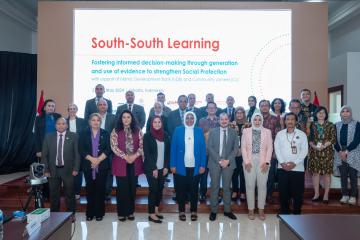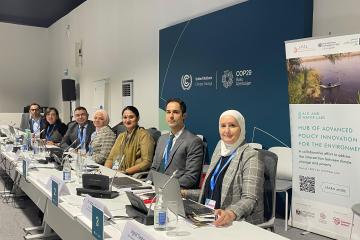
Building a culture of evidence-informed decisions in the Middle East and North Africa: Celebrating five years of J-PAL MENA
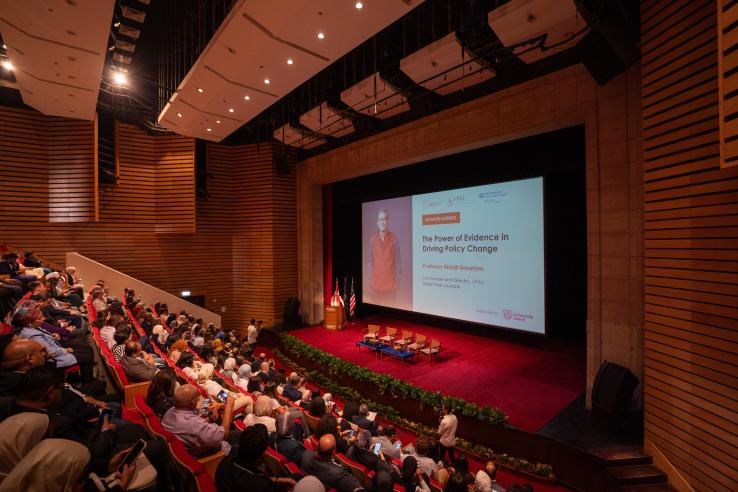
This year marks a major milestone for J-PAL Middle East and North Africa (MENA): five years since our regional office officially launched at The American University in Cairo (AUC).
J-PAL MENA was established in 2020 in response to growing recognition of the need to embed evidence into decision-making across the region. Our goal was not simply to conduct randomized evaluations, but to work hand-in-hand with governments and development practitioners to foster a culture of learning—one where programs are tested, adapted, and scaled based on what works to improve development outcomes.
We set out with an ambitious vision: to bridge research and policy through collaborations grounded in local contexts and to nurture a growing network of policymakers and researchers committed to using evidence for social impact.
As we reflect on this journey, we are filled with gratitude for the partners and donors who believed in our vision, the researchers who made ambitious projects possible, and the policymakers who championed evidence-informed approaches to tackle some of the region’s most pressing challenges. Our mission remains as vital today as it was five years ago: to reduce poverty and improve lives by ensuring that policy is informed by rigorous evidence.
Partnering with governments and launching policy labs
A cornerstone of our work over the past five years has been deepening partnerships with government agencies to institutionalize the use of rigorous research in decision-making. In 2022, J-PAL MENA launched the Egypt Impact Lab (EIL), in collaboration with Egypt’s Ministry of Planning, Economic Development, and International Cooperation, to co-generate evidence on the effectiveness of flagship national programs and guide scale-up decisions across priority sectors.
Building on this model, in 2025, we launched the Hub for Advanced Policy Innovation for the Environment (HAPIE), an initiative focused on testing and scaling innovative solutions to enhance access to clean air and water and support more effective environmental policymaking.
Our former Morocco Employment Lab, established in 2020, also evolved in 2024 to become the Morocco Innovation and Evaluation Lab. This transformation reflects an expanded mandate to support a broader set of government partners across sectors such as education, social protection, firm growth, agriculture, and the environment.
Through these labs, we work to embed learning, evaluation, and evidence use into government systems and lay the groundwork for more effective and data-driven policymaking across the region.
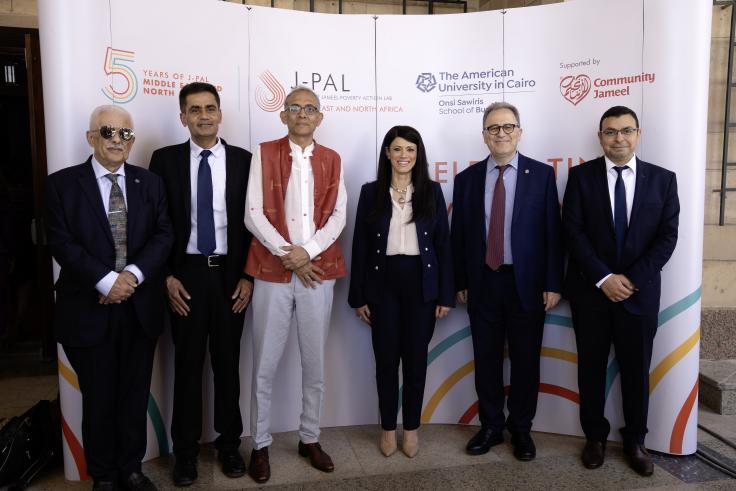
Photo credit: Career 180°
Highlights from our journey
To date, J-PAL MENA has supported over sixty randomized evaluations across nine countries in the region, covering key sectors including education, labor markets, gender, health, social protection, and environmental sustainability. This work has been made possible through collaborations with more than twenty donors and seventy partners committed to generating evidence to inform policy and practice.
Building capacity for evidence-informed decision-making has been a central pillar of our approach. We have trained over 500 government officials and development practitioners by tailoring and delivering J-PAL’s flagship course, Evaluating Social Programs, and other J-PAL MENA-specific capacity-building offerings. These trainings help strengthen institutional understanding of how to generate, interpret, and use rigorous evidence.
Recognizing the importance of local leadership in research, we launched the MENA Scholars Fellowship in 2023. This initiative mentors and supports early-career researchers from the region, helping build a robust pipeline of MENA-based scholars equipped to lead high-quality evaluations. Through the Fellowship and other collaborative initiatives, we are expanding opportunities for emerging researchers to co-lead cutting-edge research alongside J-PAL affiliated researchers.
Our research network has also grown significantly. By partnering with close to 120 researchers, we have been working towards strengthening the local research ecosystem and enabling more contextually relevant and policy-driven research. To date, over 25 local and regional researchers have collaborated with J-PAL affiliated researchers to lead randomized evaluations across the region.
Through these efforts, we have strengthened our role as a knowledge convener by hosting many events and deepening collaborations like the Global Evidence for Egypt Spotlight Seminar Series, which brings together global and local experts to spotlight policy-relevant insights for Egypt’s development priorities. We have also collaborated with J-PAL regional offices, including J-PAL Southeast Asia, to promote South-South learning and create space for policymakers to exchange experiences and learn from effective, evidence-based interventions implemented in similar contexts.
Our commitment to scaling what works has also led to exciting developments. Following the success of the Bab Amal graduation pilot in Upper Egypt, we are now supporting the program’s expansion through a multi-partner collaboration focused on improving livelihoods for ultra-poor households at scale. The program aims to reach 100,000 households in Upper Egypt by 2028 in close collaboration with the Government of Egypt. Building on this work, we are actively exploring opportunities to scale additional programs that have been piloted, rigorously evaluated, and shown to be effective.
Together, these efforts reflect J-PAL MENA’s holistic approach to advancing evidence-informed policymaking by generating rigorous research, building local capacity, and forging partnerships that translate evidence into meaningful impact.
What we’ve learned and the road ahead
One of the most important lessons we’ve learned over the past five years has been that building trust takes time. Meaningful partnerships with government institutions, civil society organizations, and international actors require sustained dialogue, adaptability, and a deep respect for local contexts, priorities, and constraints. We’ve learned that promoting evidence-informed policymaking is not only about technical rigor; it is equally about cultivating relationships, fostering shared ownership, and creating space for mutual learning.
Our work has also taught us that regional dynamics—political transitions, economic volatility, conflict, displacement, and crises like the Covid-19 pandemic—can both challenge and accelerate opportunities for research and policy engagement. Navigating these complexities has underscored the importance of responsiveness, humility, and long-term commitment in our approach.
Looking ahead, J-PAL MENA is entering its next chapter with a renewed sense of purpose and ambition. Over the next five years, we will deepen our work across priority areas that are critical to the region’s development. This includes climate resilience and environmental protection, where we will explore innovations to enhance sustainability and adaptation to climate change. It also includes youth employment and skills development, a longstanding regional challenge that we aim to address through rigorous evaluations of active labor market policies. We will deepen our engagement in health systems and education reform, identifying what works to improve service delivery and human capital outcomes.
In parallel, we will focus more on humanitarian settings, supporting efforts to generate evidence in fragile contexts and inform programming for displaced populations. Promoting gender equity and women's economic and social empowerment will remain a core priority across all of our work. In a region where women continue to face systemic barriers to employment, mobility, and decision-making, we are committed to identifying and scaling interventions that expand opportunities, agency, and well-being for women and girls.
As we broaden our sectoral focus, we are also sharpening our ambition around scale and regional expansion. Over the next phase, J-PAL MENA will prioritize efforts to translate effective pilot interventions into sustainable, government-led programs. We will work with our partners to identify scalable models, provide technical support for policy adoption and institutionalization, and generate the evidence needed to guide implementation at scale across countries in the MENA region.
None of this would be possible without the extraordinary support of our funders, implementing partners, affiliated researchers, J-PAL MENA team, and colleagues across the global J-PAL network. We are deeply grateful for the collaborations that have brought us to this moment, and we are energized by the road ahead.
As we mark this milestone, we are reminded that building a culture of evidence is a long-term journey. But with a growing community of committed partners, researchers, and practitioners, we are optimistic about the future of evidence-informed policymaking in MENA, and more determined than ever to contribute to a region where programs and policies are grounded in data, driven by impact, and centered on improving lives.
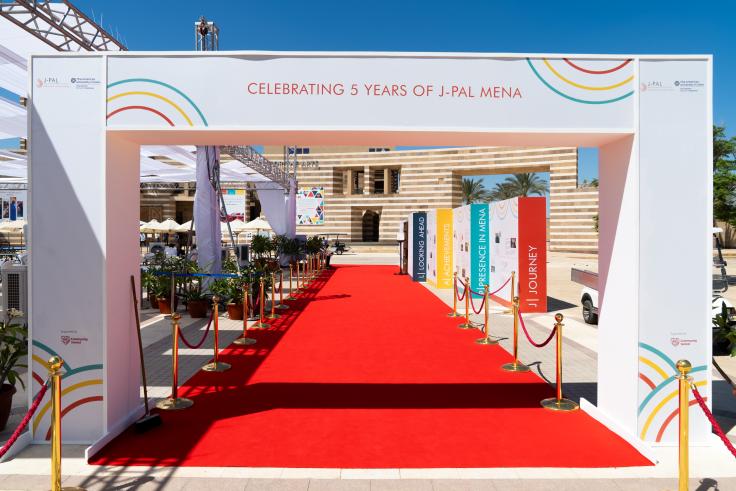
Related Content

Harnessing evidence and partnerships: Scaling climate resilience at COP29
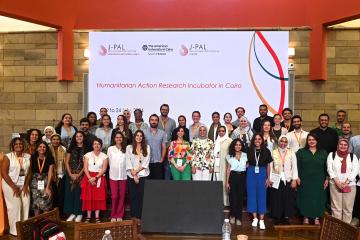
Driving evidence-based humanitarian action and displacement response in MENA
